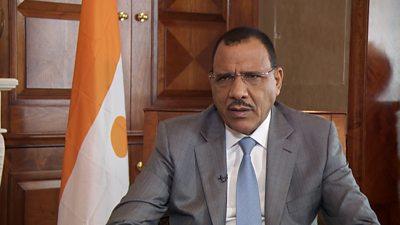Niger coup Makers Say Ousted Govt ‘Authorised French Attack to Free Bazoum’

The coup leaders who seized power last week in Niger have alleged that the toppled government had authorised France to carry out an attack on the presidential palace to try to free President Mohamed Bazoum.
The claims were made on Monday by Colonel Amadou Abdramane, one of the coup plotters, on state television. He said the authorisation was signed by Foreign Minister Hassoumi Massoudou, acting as prime minister. The claims could not be independently verified.
The whereabouts of Massoudou and Bazoum remain unknown.
France, Niger’s former colonial ruler, has condemned the coup and urged Bazoum to be reinstated but has not announced any intention to intervene militarily.
In response to allegations of authorising strikes, the French foreign ministry did not confirm or deny but instead said the only legitimate authority it recognised in Niger was Bazoum.
It also told Reuters news agency that “our priority is the security of our citizens and our facilities, which cannot be targeted by violence, according to international law.”
The presidential guard, which seized power last week after blocking Bazoum inside the palace in the capital, Niamey, has previously warned against foreign attempts to extract the president, saying it would result in bloodshed and chaos.
Abdramane’s comments also come a day after the 15-nation regional bloc Economic Community of West African States (ECOWAS) demanded that Bazoum be reinstated within a week at an emergency summit in neighbouring Nigeria.
The bloc said it would take “all measures” to restore constitutional order otherwise.
“Such measures may include the use of force for this effect,” it said in a statement.
Chadian President Mahamat Idriss Deby visited Niamey on Sunday as an ECOWAS envoy and posted photos of separate meetings with Bazoum and Omar Tchiani, the head of the presidential guard who has been named head of state.
ECOWAS also imposed strict sanctions, including suspending all commercial and financial transactions between its member states and Niger and freezing of assets in regional central banks.
Economic sanctions could have a deep impact on Niger, one of the world’s poorest countries which relies on imports from Nigeria for up to 90 percent of its power, according to the International Renewable Energy Agency.
The sanctions could be disastrous and Niger needs to find a solution to avoid them, Prime Minister Ouhoumoudou Mahamadou told French media outlet Radio France Internationale on Sunday.
“When people say there’s an embargo, land borders are closed, air borders are closed, it’s extremely difficult for people … Niger is a country that relies heavily on the international community,” he said.
Landlocked Niger has had a turbulent political history since gaining independence in 1960. Before Wednesday, there had been four coups and numerous other attempts, including two previously against Bazoum.
SOURCE: AL JAZEERA AND NEWS AGENCIES
